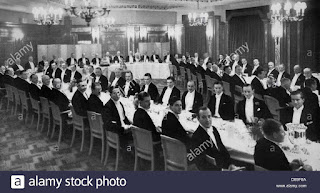Eighty years ago, Neville Chamberlain accidentally pleases an anti-Nazi crowd, Germany admits it wants to force out its Jews and a visitor to London heralds a new chapter in appeasement
Quite by accident Neville Chamberlain delivered a
speech that delighted its mainly anti-appeasement audience which proceeded to hi-jack the event for their own ends. In itself the occasion was innocuous: a formal
dinner given by the Foreign Press Association. It was the Germans themselves who made
the largest contribution to transforming the occasion into a near anti-Nazi demonstrationevent. At the last moment they had
taken umbrage at some barely contentious comments by the Prime Minister. His predecessor
Lord Baldwin had been savagely attacked in the German press for his rather tame
remarks when launching a fund to support Jewish refugees from Nazi Germany and
Chamberlain had defended him. German correspondents and diplomats pulled out of
the dinner at the last moment leaving a good number of glaringly empty places.
The audience then proceeded to treat Chamberlain’s bland speech as though it was an aggressive affirmation of the democracies in opposition to Nazi Germany. His references to Anglo-German friendship were heard out in
near silence. A statement that Britain would stand by France was treated to
sustained applause which became hysterical when he emphasised that Britain and
France were close. A passing reference to the recently signed trade agreement
with the US provoked frantic cheers.
German press articles made plain that the recent
swathe of anti-Jewish measures were intended to force Jews to emigrate for
their good and that of Germany. As a special concession it was accepted that
the Jewish community might be allowed access to securities held mandatorily in
blocked accounts at German banks to pay the imminently due first instalment of
RM250m of the RM1bn fine imposed on them.
Hjalmar Horace Greely Schacht, the President of the
German Reichsbank paid an unusual visit to London. Its declared aim was to
permit discussion with Montagu Norman, Governor of the Bank of England. Norman
and Schacht were accustomed to talking at the monthly meetings of the Bank for
International Settlements in Basel, the bank for central banks that the two men
had been instrumental in founding and to which they devoted considerable
attention. Montagu had missed the last few meetings, in part because of illness,
and wanted to make this good. The close ties between the two men were also of
interest to figures in the British government, notably Sir Horace Wilson a
close collaborator of Norman’s, who were
musing over ways to improve relations with Germany.



Comments
Post a Comment